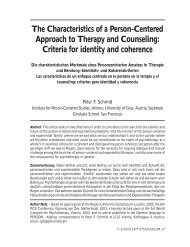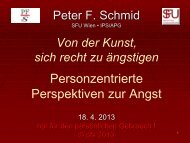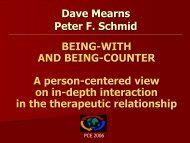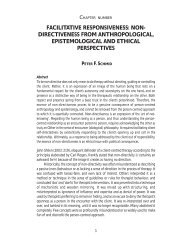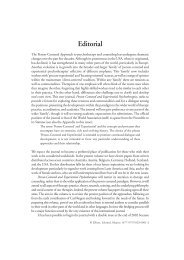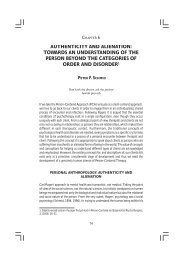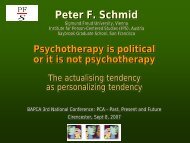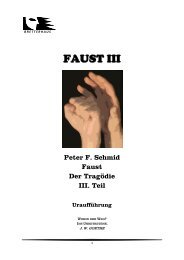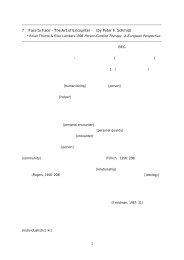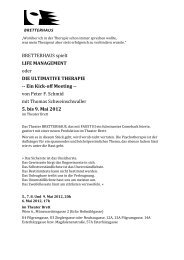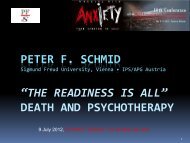Dialogue - Peter F. Schmid
Dialogue - Peter F. Schmid
Dialogue - Peter F. Schmid
Create successful ePaper yourself
Turn your PDF publications into a flip-book with our unique Google optimized e-Paper software.
5 th World Congress for Psychotherapy, Beijing 2008ACTIVE RESPONSIVENESSPerson-Centered PsychotherapyA dialogical approach<strong>Peter</strong> F. <strong>Schmid</strong>Institute for Person-Centered Studies (IPS), AustriaSigmund Freud University, ViennaSaybrook Graduate School, San Francisco
“You only hear the questionsthat you are able to answer.”Friedrich Nietzsche2
Person-Centered PsychotherapyA dialogical approachI. The development of PCT towards asubstantial-relational understandingII.Some essential foundations andcharacteristics of PCTIII. The fundamental dialogical nature of PCTand psychotherapy3
The emergence ofthe relational dimension of PCTC. R. Rogers ‘therapy as relationship or encounter’ (1962)P. F. <strong>Schmid</strong> ‘therapy as the art of personal encounter’ (1989)W. Pfeiffer ‘relationship as the central effective factor in PCT’ (1989)R. van Balen ‘Rogers’ development towards dialogue’ (1990)B. Thorne ‘intimacy’ (1991)M. O’Hara ‘relational humanism’ (1992)L. Holdstock ‘interdependent, not individuocentric nature of self’ (1993)U. Binder ‘empathy versus cognitive social perspective taking’ (1993)G. Prouty ‘pre-symbolic experiencing, contact & pre-therapy’ (1994)G. Barrett-Lennard ‘client-centered relational psychotherapy’ (1998)D. Mearns ‘dialogical model of self’ (2000)M. Warner ‘contact & fragile and dissociated process’ (2000)M. Behr ‘interactive resonance’ (2003)A. Bohart ‘the client as active self healer’ (2004)M. Cooper ‘relationally-orientated approach to therapy’ (2004)6
Bipolar model of psychotherapyP. F. <strong>Schmid</strong>:‘therapy – the art of personal encounter & dialogue’1989; 1991; 1994; 2001; 2002; 2006; 2008; <strong>Schmid</strong> & Mearns, 2006D. Mearns & M. Cooper‘working at relational depth’Mearns 1996; Mearns & Thorne, 2000; Mearns & Cooper, 2005G. Barrett-Lennard‘client-centered relational psychotherapy’1993; 1998; 2003; 2005; 20077
Growing relational understandingof therapy• Intersubjective psychoanalysis(interplay of transference-countertransference liaison …)• CBT (relationship as prelude to treatment)• Systemic therapies (negotiating …)• Existential and humanistic therapiesMartin Buber et al. Hans Trüb, Ludwig Binswanger, Viktorv. Weizsäcker, Rollo May, Irving Yalom, James Bugental, CarlRogers (therapy as relationship)9
The development of PCT towards asubstantial-relational understanding• Relationship is essential to all psychotherapy.• But the concept of encounter of PCT marks achange of paradigm.• The human being as individual-in-relationship:independence and interrelatedness.• In PCT relationship is not a means or method,rather therapy is encounter, is dialogue.10
Person-Centered PsychotherapyA dialogical approachI. The development of PCT towards asubstantial-relational understandingII.Some essential foundations andcharacteristics of PCTIII. The fundamental dialogical nature of PCTand psychotherapy11
II. Some essential foundations andcharacteristics of PCT• Person• Encounter• Fundamental We• Presence• Personalization• Group
The state of the art of PCT• Person• substantial-relationalnature• independence &interconnectedness• image of the human being:personal anthropology,phenomenological,existential
• EncounterThe state of the art of PCT• the Other• epistemology of alterity• Thou-I-relationship
The state of the art of PCT• Fundamental We• encounter as core of aco-creative process• co-responding to the existentialsituation• bi-polar model of psychotherapy:client makes acknowledgementand empathy of the therapist work
• Presence• to be fully thereThe state of the art of PCT• authenticity,acknowledgment,comprehension• the core condition ofbeing-with and being-counter
The state of the art of PCT• Actualizing processas personalization• energeia-dynamis / act-potencyefficient cause (causa efficiens)• dialectical understanding ofthe actualizing tendency• actualizing tendencyas social construct(no development totally-by-itself)• personalizing tendency: freedom & creativity
The state of the art of PCT• Group• „the Third“• the primary locus of therapy• the interface ofindividual & society• PCA is a group approach
Person-Centered PsychotherapyA dialogical approachI. The development of PCT towards asubstantial-relational understandingII. Some essential foundations andcharacteristics of PCTIII. The fundamental dialogical nature of PCTand psychotherapy19
Different meanings of ‘dialogue’ in PCTJ. Finke & L. Teusch the dialogical must be amended by a functional relationshipG. Lietaer dialogical working allianceK. Tudor & T. Merry dialogue is ‘a precondition for therapy and the therapy itself’A. Bohart co-constructive dialogue as meeting of mindsK. Tudor & M. Worrall dialogue is the practice and mutuality is the outcomeP. Sanders dialogue is the co-created relationship between the helperand the person helpedD. Mearns & M. Cooper working at relational depth:not a school of therapy, but the idea that therapy is dialogue‘state of profound contact and engagement between twopeople in which each person is fully with the Other …’specific moments of encounter & a particular qualityof a relationship20
What does ‘dialogue’ mean?* Greek ‘δια-λεγειν’δια = between (inter)λεγειν = pick up, gather, collect; talk, speakto put something apart by thinking over itλογος = word, meaning, significance‘between words’ flowing of meaning21
<strong>Dialogue</strong>: the conventional meaning• human conversation face to face,mutual exchange, discourse,interchange in talkingv. entre-tien (conversation), inter-course (social communication)• symmetry and equality• a meeting of the one with the other22
<strong>Dialogue</strong>: Socrates• pro-active search for wisdom• εὐ ζῆν: to live a good and truthful life• a pedagogical instrument23
<strong>Dialogue</strong>: Martin BuberInterpersonality <strong>Dialogue</strong>“The sphere of the interpersonalis the opposite-to-each-other;its unfolding is what we calldialogue.” Buber, 1948I-Thou relationship24
<strong>Dialogue</strong>: Emmanuel Levinas• of original im-media-cy• not a consequence of experience• primary occurrence• dissymetric:The other comes first.25
<strong>Dialogue</strong>: Emmanuel Levinas<strong>Dialogue</strong> Interpersonality“It is precisely because the Thouis absolutely different from the Ithat there is - from the one to theother - dialogue.” Levinas, 1981Thou-I relationship26
<strong>Dialogue</strong>: Emmanuel Levinas• Solidarity is a basic humancondition.• It means to say: “Here I am.”• This dissymetry is theorigin of ethics.• The I is constituted by his/herresponsibility.27
<strong>Dialogue</strong>____________Self-consciousness dialogue<strong>Dialogue</strong> self-consciousness28
<strong>Dialogue</strong>The human person is dialogue.29
What does a dialogical understandingof PCT mean?• A true humanistic therapy is not egology.• Being concerned with the therapist attitudesabove all = „therapist-centredness“.• The client comes first.30
What does a dialogical understandingof PCT mean?Psychotherapy meansto enter dialogue.31
What does a dialogical understandingof PCT mean?Psychotherapy meansto enter dialogue.32
What does a dialogical understandingof PCT mean?• <strong>Dialogue</strong> is in the very beginning of therapy.• The persons engaged in therapy are dialogue.33
Therapy as dialogue?___________Psychotherapy dialogue<strong>Dialogue</strong> psychotherapy34
What does a dialogicalunderstanding of PCT mean?• <strong>Dialogue</strong> is in the very beginning of therapy.• The persons engaged in therapy are dialogue.• Therapy is the unfolding of dialogue.• Presence is an expression of the fundamental“Here I am”.• Encounter is the realization of dialogue.• Ethically therapy is a way of “being for” theclient.35
What does a dialogicalunderstanding of PCT mean?The dialogical understanding of PCTis a deepening of the comprehensionof its image of the human being:the person.36
• Ethical task<strong>Dialogue</strong> – an ethical enterprise& a political statementTo be existentially challenged as a person and as aprofessional.• Political taskTo resist problem- and solution-centeredness.To avoid the trap of the customary politics of the helpingprofessions.• To develop a truly human science, research and practice.37
‘You only hear the questionsthat you are able to answer.’Friedrich Nietzsche38
Without acknowledgementof the radical otherness of the Other‘responding wouldn’t be what it is,namely a way of speaking and doingthat – responding to demands of others –surprises itself’.Bernhard Waldenfels39
welcome topca-online.netThe Person-Centered Websiteby <strong>Peter</strong> F. <strong>Schmid</strong>Die personzentrierte HomepageLe site centré sur la personneDe Persoonsgerichte SiteSite da Abordagem Centrada na PessoaPágina Web Centrada en la Persona



